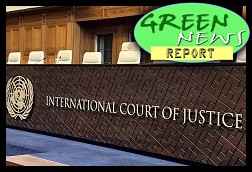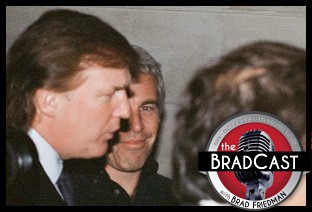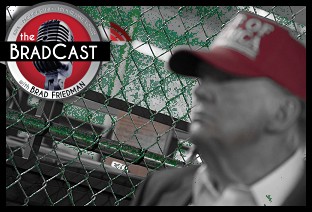Guest Blogged by Tova Andrea Wang, a Democracy Fellow at The Century Foundation.
ED NOTE: Ms. Wang was chosen by the U.S. Elections Assistance Commission (EAC) to provide research and analysis for a report on "voter fraud." That report --- about which an early "status report" version [PDF] leaked out after the EAC, apparently unhappy with the findings, failed to release it publicly --- showed little or no actual evidence of "voter fraud" in America. The EAC finally released their "final version" of the report [PDF] on December 7th, retitled with a freshly coined phrase: "Election Crimes."
Over the past month, the silence has been deafening.
For the past few years, many on the Right have been vociferously propagating the myth that voter fraud at the polling place is a rampant problem of crisis proportions. But we haven’t heard from them lately. In fact, as far as my research can discover (Nexis and Google news searches of multiple relevant terms), there has not been one confirmed report of any of these types of incidents in the 2006 election. Not one. Even the Republican National Committee’s vote fraud watch operation in their list of complaints from the 2006 election could not come up with one such case.
If you’ve been listening to the likes of John Fund, Thor Hearne, Ken Mehlman, and John Lott, you would think non-citizens are lining up to vote at the polls, mischievous partisans are voting multiple times by impersonating other voters, and dead people are voting in polling places across the country. In order to justify their argument that we need all voters to present government issued photo identification at the polls, they claim that this type of fraud is the biggest problem our electoral system confronts. They have been building and building this argument, hammering and hammering away at it to the point that it has now become the prevailing belief of the American public.
I won’t go into the recitation of all of the previous research that has been done on what a nonexistent problem polling place fraud is and the fraudulent disenfranchisement narrow voter identification requirements cause among perfectly eligible voters—disproportionately minorities, the poor, the elderly, and voters with disabilities (who by the way, according to conventional wisdom, are also all disproportionately Democratic voters). However, confronted with this continuously growing mountain of evidence undermining their case, it has been interesting to observe the evolution of the Right’s spinning of this issue of late.
In recent months, even before this election, slowly recognizing the remarkable weakness of their substantive argument, conservatives’ new tack has been to say that even if its true that there is not much polling place fraud, the simple fact that the American people believe it is occurring is a problem itself in that it is causing them to lose confidence in the election system. Well, no wonder they have the misguided belief that this is a problem—that’s the message the Right has been hammering away at them over the last few years. In any case, the argument goes that we need identification requirements not because they will in actuality do anything to enhance the integrity of the voting process, but because we need to reassure people who have the perception the process is corrupt.
Let me provide just a few examples of this...
In their answer in the identification litigation in Indiana, the state outright admitted that there had never been a single, solitary case of polling place fraud in the history of the state. Nevertheless, the state argued. A state may take action to avoid the appearance of fraud as well as its actual occurrence. A Rasmussen Report poll found that 58% of Americans believed that there was a lot or some fraud in American elections, and a Gallup poll after the 2000 election showed that 67% of adults nationally had only some or very little confidence in the way votes are cast and counted in our country. Public perceptions, grounded on publicly reported evidence of fraud such as that identified above [by the people I mentioned earlier] are a further justification for fraud prevention requirements like Indiana ’s photo ID law.
During the argument over photo identification before the Supreme Court in Michigan, the assistant attorney general conceded there is no evidence of widespread voter fraud but rather “a concern about it.” The esteemed Carter-Baker Commission wrote, “There is no evidence of extensive fraud in US elections or of multiple voting...but the electoral system cannot inspire confidence if no safeguards exist to deter or detect fraud or confirm the identity of voters....The problem is not the magnitude of fraud...the perception of possible fraud contributes to low confidence in the system.”
The Supreme Court may even be starting to buy into this rhetoric. In the recent Purcell case regarding Arizona’s identification law, Justice Kennedy wrote, “Confidence in the integrity of our electoral processes is essential to the functioning of our participatory democracy. Voter fraud drives honest citizens out of the democratic process and breeds distrust of our government. Voters who fear their legitimate votes will be outweighed by fraudulent ones will feel disenfranchised.”
Georgia has twice passed voter identification requirements, in 1997 and 2005, basing the need for such barriers to the vote on instances of vote buying and absentee ballot fraud—two methods of voting that identification would do nothing about. More myths.
Basing voting rights laws upon purposely created misunderstandings of what the issues are is not a sound way to develop public policy. Rather than creating fake problems and then passing disenfranchising laws that purport to address them, we might do a better job of educating the American electorate as to what the real problems are in our voting system, and what they are not. It is only then that we will begin to address the flaws in the election systems that disenfranchise tens of thousands of voters in every major election.
This essay was originally published at The Century Foundation where Tova Andrea Wang is a Democracy Fellow. Hat-tip to VoteTrustUSA.org.


 A Pu Pu Platter of Trump Corruption: 'BradCast' 7/29/25
A Pu Pu Platter of Trump Corruption: 'BradCast' 7/29/25  'Green News Report' 7/29/25
'Green News Report' 7/29/25
 GOP Cuts to Medicaid, Medicare, ACA Could Trigger 'Catastrophic' Crisis This Fall: 'BradCast' 7/28/25
GOP Cuts to Medicaid, Medicare, ACA Could Trigger 'Catastrophic' Crisis This Fall: 'BradCast' 7/28/25 Sunday 'Pedo Files' Toons
Sunday 'Pedo Files' Toons Landmark Climate Ruling at World Court; More Epstein Trouble for Petty Little Tyrant: 'BradCast' 7/24/25
Landmark Climate Ruling at World Court; More Epstein Trouble for Petty Little Tyrant: 'BradCast' 7/24/25 'Green News Report' 7/24/25
'Green News Report' 7/24/25 Trump's Epstein 'Conspiracy Machine Not Going Away': 'BradCast' 7/23/25
Trump's Epstein 'Conspiracy Machine Not Going Away': 'BradCast' 7/23/25 Dems Unlikely to Counter GOP's TX Redistricting Scheme: 'BradCast' 7/22/25
Dems Unlikely to Counter GOP's TX Redistricting Scheme: 'BradCast' 7/22/25 'Green News Report' 7/22/25
'Green News Report' 7/22/25 Not a Drill!: Trump Gutting News Media, Press Freedoms: 'BradCast' 7/21/25
Not a Drill!: Trump Gutting News Media, Press Freedoms: 'BradCast' 7/21/25 Sunday 'Wonderful Secret' Toons
Sunday 'Wonderful Secret' Toons 'Green News Report' 7/17/25
'Green News Report' 7/17/25 CO Election Clerks Block Vote System Breach: 'BradCast' 7/17/25
CO Election Clerks Block Vote System Breach: 'BradCast' 7/17/25 'Superman is Story of America'. No Wonder MAGA Hates Him: 'BradCast' 7/16/25
'Superman is Story of America'. No Wonder MAGA Hates Him: 'BradCast' 7/16/25  Trump IRS: Churches May Endorse. (Are All Nonprofits Next?): 'BradCast' 7/15/25
Trump IRS: Churches May Endorse. (Are All Nonprofits Next?): 'BradCast' 7/15/25 Support for Immigrants Skyrockets Amid Trump's Crackdown: 'BradCast' 7/14/25
Support for Immigrants Skyrockets Amid Trump's Crackdown: 'BradCast' 7/14/25  Democracy STILL Our Best Way Out of This -- And Repubs Know It: 'BradCast' 7/10/25
Democracy STILL Our Best Way Out of This -- And Repubs Know It: 'BradCast' 7/10/25 'Mass Shooter Subsidy'?: More Dumb, Deadly Stuff in Trump's New Law: 'BradCast' 7/9/25
'Mass Shooter Subsidy'?: More Dumb, Deadly Stuff in Trump's New Law: 'BradCast' 7/9/25  Trump's New Law Supersizes ICE, Mass Detention: 'BradCast' 7/8/25
Trump's New Law Supersizes ICE, Mass Detention: 'BradCast' 7/8/25 Texas Flooding Tragedy Was Both Predictable and Predicted: 'BradCast' 7/7/25
Texas Flooding Tragedy Was Both Predictable and Predicted: 'BradCast' 7/7/25
 VA GOP VOTER REG FRAUDSTER OFF HOOK
VA GOP VOTER REG FRAUDSTER OFF HOOK Criminal GOP Voter Registration Fraud Probe Expanding in VA
Criminal GOP Voter Registration Fraud Probe Expanding in VA DOJ PROBE SOUGHT AFTER VA ARREST
DOJ PROBE SOUGHT AFTER VA ARREST Arrest in VA: GOP Voter Reg Scandal Widens
Arrest in VA: GOP Voter Reg Scandal Widens ALL TOGETHER: ROVE, SPROUL, KOCHS, RNC
ALL TOGETHER: ROVE, SPROUL, KOCHS, RNC LATimes: RNC's 'Fired' Sproul Working for Repubs in 'as Many as 30 States'
LATimes: RNC's 'Fired' Sproul Working for Repubs in 'as Many as 30 States' 'Fired' Sproul Group 'Cloned', Still Working for Republicans in At Least 10 States
'Fired' Sproul Group 'Cloned', Still Working for Republicans in At Least 10 States FINALLY: FOX ON GOP REG FRAUD SCANDAL
FINALLY: FOX ON GOP REG FRAUD SCANDAL COLORADO FOLLOWS FLORIDA WITH GOP CRIMINAL INVESTIGATION
COLORADO FOLLOWS FLORIDA WITH GOP CRIMINAL INVESTIGATION CRIMINAL PROBE LAUNCHED INTO GOP VOTER REGISTRATION FRAUD SCANDAL IN FL
CRIMINAL PROBE LAUNCHED INTO GOP VOTER REGISTRATION FRAUD SCANDAL IN FL Brad Breaks PA Photo ID & GOP Registration Fraud Scandal News on Hartmann TV
Brad Breaks PA Photo ID & GOP Registration Fraud Scandal News on Hartmann TV  CAUGHT ON TAPE: COORDINATED NATIONWIDE GOP VOTER REG SCAM
CAUGHT ON TAPE: COORDINATED NATIONWIDE GOP VOTER REG SCAM CRIMINAL ELECTION FRAUD COMPLAINT FILED AGAINST GOP 'FRAUD' FIRM
CRIMINAL ELECTION FRAUD COMPLAINT FILED AGAINST GOP 'FRAUD' FIRM RICK SCOTT GETS ROLLED IN GOP REGISTRATION FRAUD SCANDAL
RICK SCOTT GETS ROLLED IN GOP REGISTRATION FRAUD SCANDAL VIDEO: Brad Breaks GOP Reg Fraud Scandal on Hartmann TV
VIDEO: Brad Breaks GOP Reg Fraud Scandal on Hartmann TV RNC FIRES NATIONAL VOTER REGISTRATION FIRM FOR FRAUD
RNC FIRES NATIONAL VOTER REGISTRATION FIRM FOR FRAUD EXCLUSIVE: Intvw w/ FL Official Who First Discovered GOP Reg Fraud
EXCLUSIVE: Intvw w/ FL Official Who First Discovered GOP Reg Fraud GOP REGISTRATION FRAUD FOUND IN FL
GOP REGISTRATION FRAUD FOUND IN FL

































